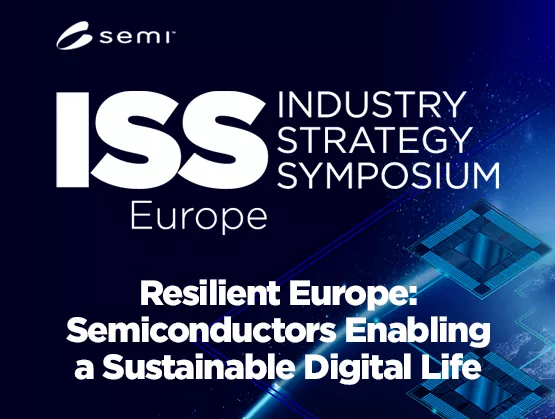
The timely return to an in-person Industry Strategy Symposium (ISS) Europe was welcomed by participants from around the globe on May 30th at the Brussels Sheraton. ISS Europe 2022 featured a new program and event format – with industry insights and strategic topics condensed into one day of programming on three critical challenges facing the microelectronics industry: the energy crisis and sustainability, supply chain disruptions, and the talent pipeline shortage.
The past two years have witnessed an imbalance of chip supply and demand that impacted the entire semiconductor industry and many adjacent industries, as well as consumers globally. While challenging, this disruption presented an opportunity for European companies and governments to reflect on regional strategies and positioning in the microelectronics sector. As a result, companies and the industry at large are re-evaluating supply chain management, assessing the need for healthy coopetition, evolving HR policies to cultivate the workforce of tomorrow, and collaborating on efforts to achieve the ambitious goals of the proposed European Chips Act.
The European Chips Act will address semiconductor shortages and strengthen Europe’s technological leadership by mobilizing more than 43 billion euro of public and private investments. The Act aims to:
- Set measures to prepare, anticipate, and swiftly respond to any future supply chain disruptions, with objectives to strengthen Europe’s research and technology leadership towards smaller and faster chips,
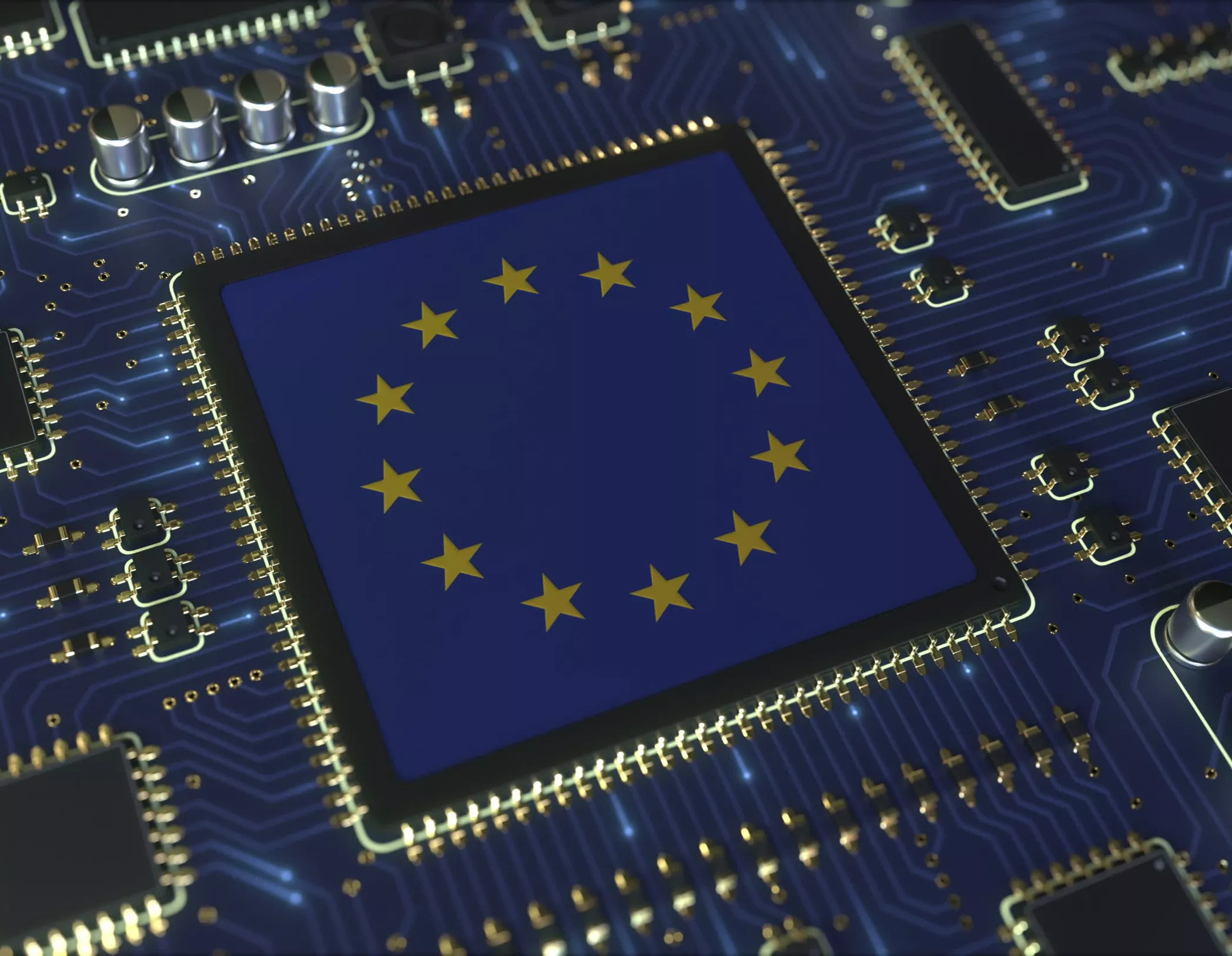 Build and reinforce capacity to innovate in the design, manufacturing, and packaging of advanced chips,
Build and reinforce capacity to innovate in the design, manufacturing, and packaging of advanced chips,- Put in place a framework to increase production capacity to 20% of the global market by 2030,
- Develop an in-depth understanding of the global semiconductor supply chains and,
- Address the skills shortage, attract new talent, and support the emergence of a skilled workforce.
In his opening, Laith Altimime, President of SEMI Europe, highlighted the challenge of how European companies will satisfy the objectives of the European Chips Act to meet the tremendous demand for chips, accelerate innovation, and drive growth from 8% of global production to 20% by 2030.
“We must seize the opportunity to elevate Europe’s global position within the industry, and success will depend on companies setting strategic agendas that address the challenges, while working with partners, governments, and supply chains to accelerate European progress,” Altimime said. “Europe hosts multiple cutting-edge companies from innovation to applications and system integrators to compete in the data battlefield. We must continue to invest, building on the core strengths of Europe to achieve the goal to produce 20% of the world’s microchips by 2030, and drive a more resilient ecosystem to maintain leadership and competitive edge in the digital era.”
He noted that cross industry collaboration will be fundamental to success, specifically in the automotive and medical sectors.
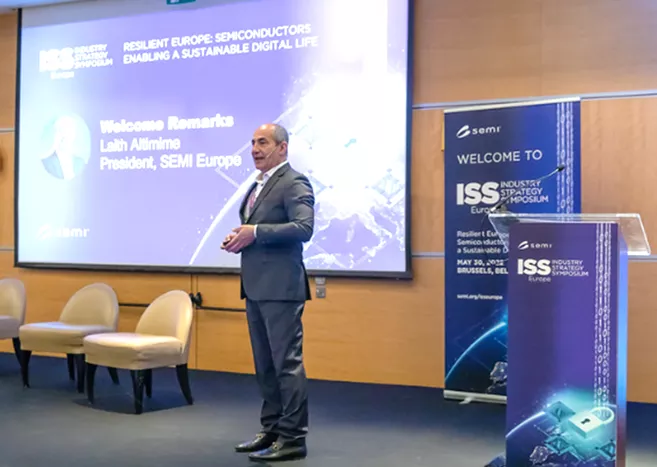
Laith Altimime, President of SEMI Europe
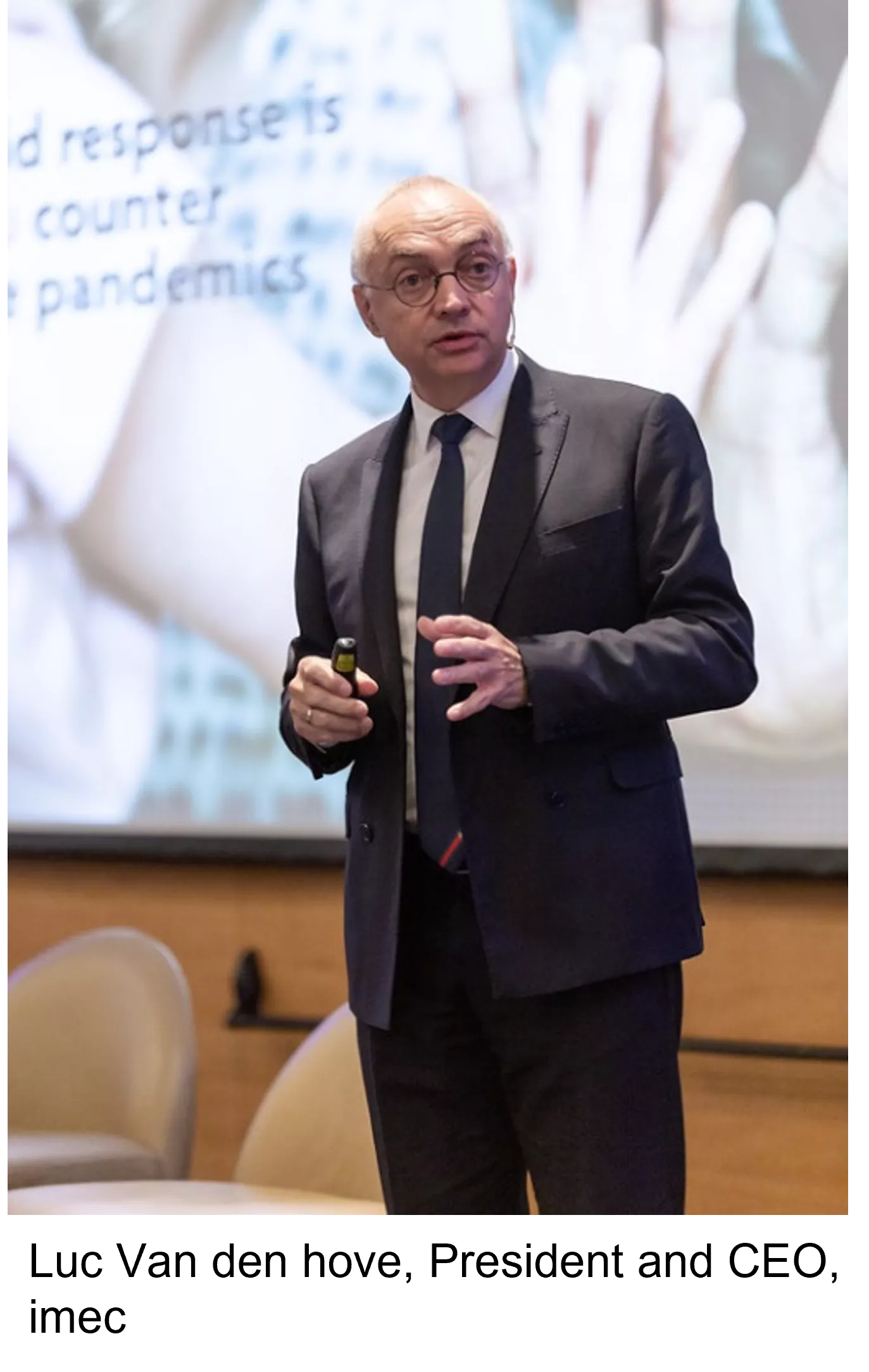 During his talk, Deep Tech: the Lodestar to Meet the Challenges of the 21st Century, Luc Van den hove, President and CEO at imec, elaborated further on the convergence of microelectronics with disciplines such as medical, pharmaceutical, and digital tech to achieve innovative breakthroughs, highlighting several that arose from the pandemic such as full PCR test on chip and mRNA writing on silicon, which will pave the way for affordable, personalized therapies. Critical factors to achieve such breakthroughs are system technology co-optimization and leveraging the knowledge from other disciplines for semiconductor-enabled applications. Disruptive deep tech innovations based on chip technology are needed, and collaboration beyond the deep tech ecosystem is essential to overcoming 21st century challenges and to achieving the ambitious objectives of the EU Chips Act.
During his talk, Deep Tech: the Lodestar to Meet the Challenges of the 21st Century, Luc Van den hove, President and CEO at imec, elaborated further on the convergence of microelectronics with disciplines such as medical, pharmaceutical, and digital tech to achieve innovative breakthroughs, highlighting several that arose from the pandemic such as full PCR test on chip and mRNA writing on silicon, which will pave the way for affordable, personalized therapies. Critical factors to achieve such breakthroughs are system technology co-optimization and leveraging the knowledge from other disciplines for semiconductor-enabled applications. Disruptive deep tech innovations based on chip technology are needed, and collaboration beyond the deep tech ecosystem is essential to overcoming 21st century challenges and to achieving the ambitious objectives of the EU Chips Act.
Following are key takeaways from the symposium.
Make Sustainability Happen Through Improvements in AI-powered Production, Waste Management, and Strategic Investments
Kate Wilson, President Semiconductor Division at Edwards Vacuum, echoed the notion that collaboration will be fundamental to overcoming sustainability challenges in her talk Environmental Sustainability Through Collaboration. The reality is alarming: The number of chips in use in the world is doubling every three years and at this rate, the need for general purpose computing will surpass the world’s projected power generation by 2050. While the challenges – and solutions – are multifaceted and complex, Wilson offered practical solutions that companies can implement today to avert the power crisis: build manufacturing facilities near customer facilities to reduce shipping, minimize waste in manufacturing, and recycle scrapped parts. Setting science-based targets and joining forces to influence governmental policy to decarbonize the grid will further bolster efforts to reverse climate change.
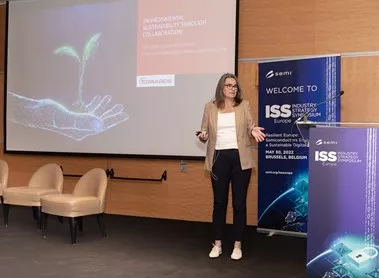
Kate Wilson, President of Semiconductor Division at Edwards Vacuum
In his talk The Semiconductor Sustainability Challenge, Guido D’hert, High Tech and Semiconductor Sustainability Lead Europe at Accenture, provided insightful data on the energy consumption of the industry – a single fab uses 1TWh of energy per year and two to four million gallons of ultra-pure water per day, while production of a 2g chip uses 1.6kg fossil fuel, 72g of chemicals and 32kg of water. This data represents where we are today, and the path to net-zero carbon emissions will require innovation in process technologies, advanced application of data and artificial intelligence (AI) in smart manufacturing solutions, adoption of a circular design to prevent e-waste, and optimization of the journey to the green cloud. Companies such as ASM, Intel, Microsoft, and Google have pledged their commitment towards green energy and the industry must follow suit.
Lynceus Co-founder and CEO, David Meyer, provided additional solutions to sustainable wafer production in his talk Improving Yield and Sustainability Through Real Time Process Control. He noted that a three-fold solution should include environmental, operational, and financial considerations, and that scrap reduction is the most direct way to enhance sustainability, underlining the benefits of AI-powered process control to save 50% of scrap using exhaustive, real-time, and adaptive methods.
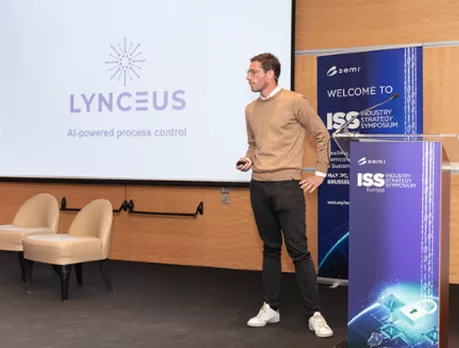
David Meyer, Co-founder and CEO at Lynceus
During the panel Semiconductors Making Environmental Sustainability Happen, speakers emphasized that it’s not just production and processing improvements that can enable sustainability, but the actual devices. Tech multinationals have already set the standard and pressure is now on the supply chain to adhere, otherwise objectives will not be met. As one panelist said, “the supply chain needs to step up.”
Companies along the value chain are keen on achieving sustainable growth and becoming green, but not at any cost. Pressure derives from end-user companies, and governmental incentives would help alleviate the cost burden to suppliers. Regulators plays a vital role in implementing laws that drive compliance to pollution and climate targets, and will include renewable electricity and energy reduction in the future. Short-term regulation on big energy consumers may be costly to them now but will significantly reduce emissions associated with electricity generation while also producing funding for future green projects. Companies need to comply with regulations, but the ROI on renewable energy must also be on the horizon – widespread adaption of renewable energy use will prove to be more challenging if it takes too long to generate a return.
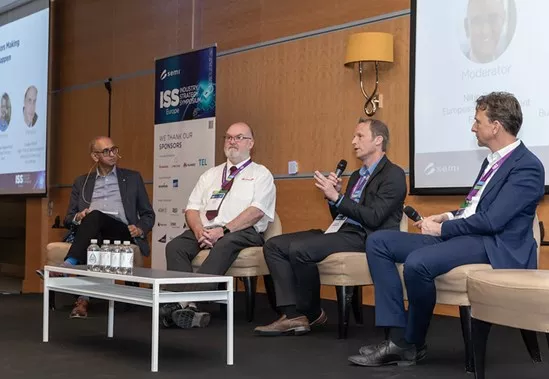
Left to right: Nitin Dahad, European Correspondent at EE Times; Chris Jones, Environmental Solutions Business Development Manager at Edwards Vacuum; Lars-Åke Ragnarsson, Program Director at imec; Guido D’hert, High Tech & Semiconductor Industry Europe Lead at Accenture
Strengthen Europe’s Supply Chain Resilience by Re-Thinking Traditional Approaches: Be More Transparent, Think Long-Term, and Focus on People
Sven Smit, Chairman at McKinsey Global Institute, opened the session with his talk Lives and Livelihoods, Lost and Disrupted, and illustrated the difference between a supply crisis (not enough for everyone) and a demand crisis (psychologically driven response to something happening in the world). He highlighted the highly competitive race for critical materials and new energy sources due to the chip shortage and supply chain disruptions, and the need to keep innovating and accelerating despite it in order to create the conditions for maximum human prosperity.
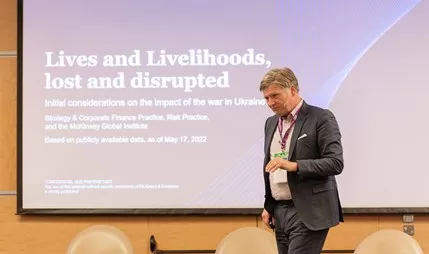
Sven Smit, Chairman at McKinsey Global Institute
In the panel What Would it Take to Double European Capacity, the discussion spanned supply chain management and new business models in a post-COVID world to investments in Europe.
Relationships between suppliers and customers are being reevaluated based on lessons learned throughout the pandemic, and collaboration is key to avoid supply chain and procurement setbacks as were experienced in the automotive sector earlier in the pandemic. There needs to be an industry-wide shift from shorter time-to-market to long-term agreements with suppliers along the value chain. If companies are more willing to provide transparency to their value chain, there will be a positive, industry-wide effect on supply chain management.
The European Commission and state governments play a crucial role in enabling the industry to achieve the production goal of 20% by 2030. Governments around the globe offer rewarding incentives for companies to build fabs, and Europe may be behind in this regard. European incentives need to be competitive, focused on front-end and back-end facilities, and impact SMEs and not just the big players. If the incentives are not available in Europe, companies will invest in new facilities elsewhere.
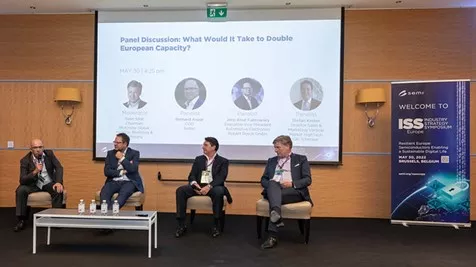
Left to right: Bernard Aspar, COO at Soitec; Jens-Knut Fabrowsky, Executive Vice President Automotive Electronics at Robert Bosch GmbH; Stefan Kester, Director Sales & Marketing Vertical Market HighTech at DB Schenker; Sven Smit, Chairman at McKinsey Global Institute
The panel also noted that for the European industry to gain an additional 12% of market share, another market must be willing to release that – or forgo future investments to sustain their current market share. While the European industry is investing in new facilities, the rest of the world is as well, therefore the pace of investments and new fab developments in Europe is critical, and governmental incentives to keep and attract companies to Europe is essential. The question was raised whether Europe will be successful on its own – or will success require external investments? If so, will Europe be willing to accept fab developments by companies from abroad?
Lastly, companies need to consider new business models as returning to a pre-COVID world will not be possible, and they must be ready to adapt and adopt a change readiness mindset throughout organizations. However, when it comes to increasing European production to 20% by 2030, innovation and capital are not the primary issues. Rather, the discussion is one of talent and economics. Does the microelectronics industry have the right people and enough of them, and are the local infrastructures available to support new fab developments in Europe?
The Industry Has a People Problem, and We Can Only Solve It with People
The objectives of the European Chips Act are ambitious and while investments and infrastructure are needed to achieve them, people are the key to success. The industry is facing a talent crisis, which has been exacerbated by the pandemic, and the pipeline to fill the jobs necessary to achieve the Chips Act goals is under-utilized. The ISS Europe session Empowering a Diverse Workforce to Achieve the European Commission Goal by 2030 addressed the widening talent shortage and shed light on what organizations can do to attract and retain the right talent to collectively achieve the goals of the European Chips Act.
In her welcome remarks, Sabine Herlitschka, CEO and CTO at Infineon Technologies Austria, highlighted the integral importance of upskilling in the microelectronics and semiconductor sector and introduced METIS, MicroElectronics Training, Industry and Skills, a four-year project co-funded by Erasmus+ that has set out to do just that by providing free e-learning to potential future hires to raise awareness about the industry and help overcome the talent shortage.
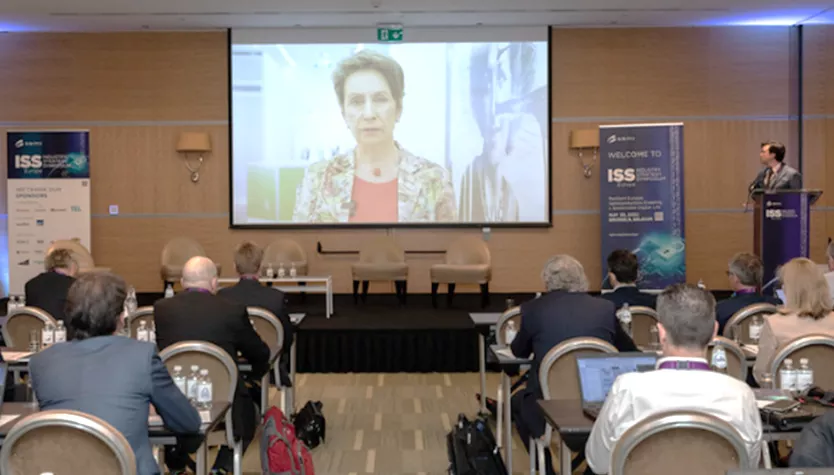
Sabine Herlitschka, CEO and CTO at Infineon Technologies Austria
Henryk Schoder, Vice President Human Resources at X-FAB Group, in his talk Chip Skills 2030: A True Challenge for Europe's Future Semiconductor Growth, shed light on the perception of the semiconductor industry, as compared to other technology industries and the automotive sector. Semiconductor companies were rated lower than both tech and automotive companies on culture and values, diversity and inclusion, work-life balance, senior management, compensation and benefits, and career opportunities (see graphic), for a combined overall score of 0.8 for semiconductor companies, and 1.1 for each tech and automotive, according to a report by McKinsey & Company published this year.
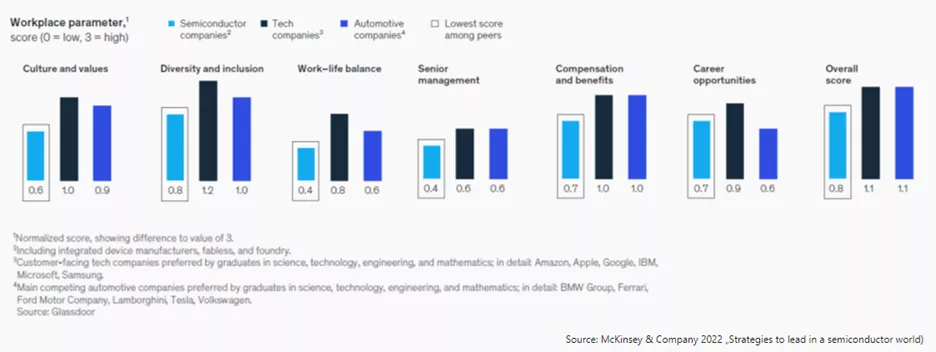
With two European fabs currently in ramp-up mode, five more 300mm fabs and two 200mm fabs announced for the coming years, and three 150mm fabs in planning, the image of the semiconductor industry has never been more critical. Nevertheless, the semiconductor industry has an image problem and there are simply not enough people available at the employment market with the right motivation and skills to support the near-future growth of the industry. There are substantial future skills missing – as well as a talent shortage today.
The solution to this problem is complex, and three-fold: The industry must:
- Improve workplace culture as well as the perception of what it’s like to work in semiconductor companies to attract candidates with transferrable skills from other industries
- Educate students long before university and even high school on the importance of semiconductors and how technology improves life quality and contributes to solving global issues like climate change
- Tap into an under-utilized talent pool by establishing women-focused recruitment initiatives
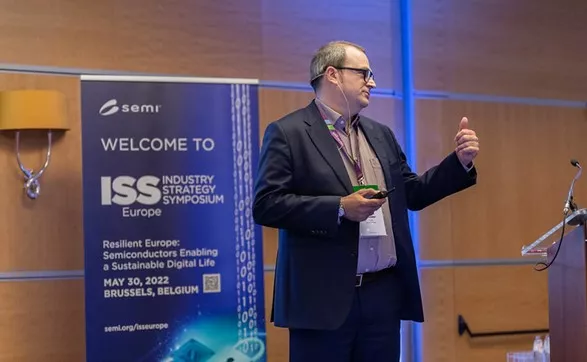
Henryk Schoder, Vice President of Human Resources at X-FAB Group
Françoise Chombar, Chairwoman at Melexis, positioned gender diversity as an opportunity to build an equitable workplace and fill the talent pipeline in her talk Accelerating Gender Balance in the Semiconductor Talent Pool.
“The semiconductor industry serves as a backbone to virtually every future-oriented market, designing solutions for connectivity, the green economy, and life sciences,” Chombar said. “It is probably the most international and inter-disciplinary, high-tech field in the world. We indeed need all STEM disciplines,” noting that Europe must keep up with the pace of change as the rest of the global industry, while generating a positive impact on society. “We can only do so if we reskill, upskill and maximize the talent pool – and if we do so fast.”
She noted the low percentage of female STEM students in European countries – most have less than 30% and only a few come close to 40%. The talent pipeline of female STEM entrants is significantly lower than that of males, and the low inflow is intensified by a high career drop out by women in STEM careers, which increased during the pandemic.
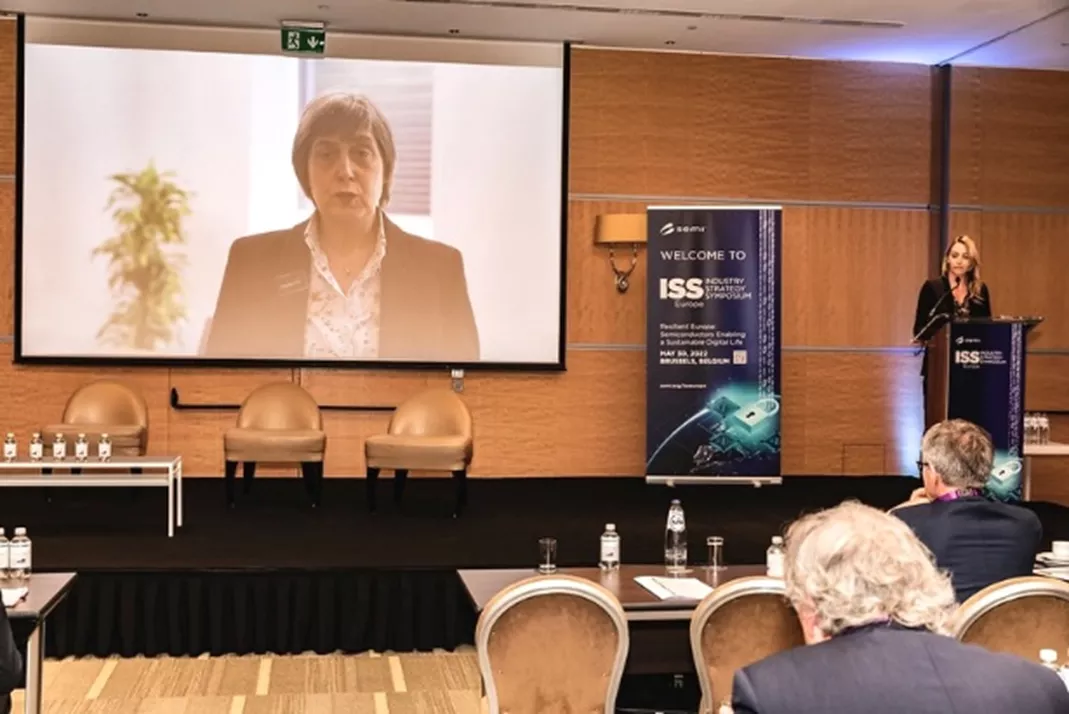
Françoise Chombar, Co-founder and former CEO, current Chairwoman at Melexis (on screen); Cassandra Melvin, Senior Director of Business Development and Operations at SEMI Europe (right)
Why should companies care? According to Chombar, accelerating gender balance in the microelectronics industry represents benefits for both employees and companies in terms of higher levels of job satisfaction, a greater sense of community among employees, exponential innovation through diversity of thought, and increased profitability. She offered takeaways that are easy to implement, yet impactful: individuals need to be aware of their own unconscious biases and realize they can unlearn them, and companies must bring inspiring female semiconductor role models into the public spotlight and into the classroom.
During her presentation Inspirations, Motivations and Barriers on Engineering Career Journey, Insights from the Engineering Inspiration Report, Joni Podolsky, Director of Global Inclusion and Diversity at KLA, reiterated the importance of starting early to promote STEM to young students and emphasized that there should be a stronger focus on soft skills as necessary for both technical and non-technical roles. She added that hiring managers and companies in general need to be willing to look beyond the usual talent pool and consider different types of degrees and profiles. Podolsky emphasized that hiring qualified and motivated candidates with adjacent skills from other industries, and allowing them to learn on the job, will help companies diversify their workforce and begin to close to talent gap.
Podolsky highlighted another remarkable point – this is the first time in history that so many generations are working together within companies: Boomers, Generation X, Millennials, and Generation Z. Generational differences are important to consider because they impact workplace behavior and motivation. For example, Millennials and Gen Z generally think differently about the world than older generations, and they tend to focus on the now. These generations are empowered by the drive to make a positive change in the world, and world events and social issues inspire their passion. The more we can connect what we do in the industry to solving global problems that are impacting the world, the more successful we will be in recruitment.
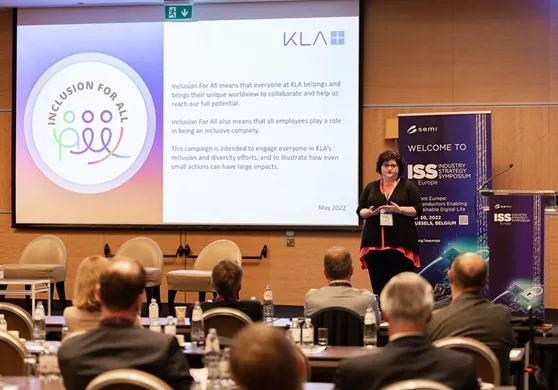
Joni Podolsky, Director of Global Inclusion and Diversity at KLA
Panelists offered insights and advice to companies on recruiting and empowering a diverse workforce.
- The importance of improving employee benefits and compensation packages to remain competitive and retain employees – this is more relevant today than in the past, due to remote working that enables people to job-hop more easily.
- The need for companies to genuinely focus on employee well-being and mental health, particularly since the onset of the pandemic. Some regions have made greater progress than others, and programs and initiatives should be implemented on a global scale to be impactful.
- New challenges arose from remote working like the rise of proximity bias or the idea that employees with close physical proximity to their team and company leaders will be perceived as better workers and ultimately find more success in the workplace than their remote counterparts. Leaders may need to revise their unconscious bias trainings to overcome this and should also focus on infusing inclusivity into a remote or hybrid working environment so that employees feel a sense of belonging regardless of their location.
- Traditional leadership models no longer apply – today’s leaders need to be inclusive, agile, and resilient. The leadership narrative has changed, and leaders must empower and inspire, and need not be the experts.
- Diversity is up to hiring managers, and inclusion is the responsibility of every employee. Companies need to look for culture add, as compared to culture fit during hiring to ensure that new employees are contributing to the workplace culture in a way that makes it better.
- Diversity is a business issue and all the benefits that come with diversity will drive innovation. Companies need the best and brightest ideas to create innovative products and solutions at the pace of technological process and thought diversity will get them there.
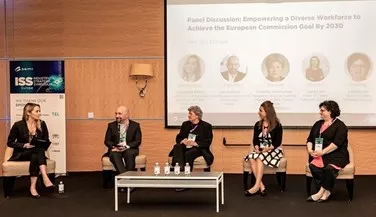
Left to right: Cassandra Melvin, Senior Director of Business Development and Operations at SEMI Europe; Dan Drellich, Vice President Sector HR Electronics at Merck; Caroline Schwuchow, Managing Director and General Manager ICAPS Central Europe at Applied Materials; Laura Lane, Head of Talent at Edwards Vacuum; Joni Podolsky, Director Global Inclusion and Diversity at KLA
Christopher Frieling, Director of Advocacy and Public Policy at SEMI Europe, further elaborated on the Pact for Skills for microelectronics, which focuses on upskilling and reskilling, and outlined how the European Chips Skills 2030 Academy will be crucial to supporting the success of the European Chips Act. The vision of the European Chips Skills 2030 Academy is that by 2030, Europe has a highly skilled and well-trained workforce in microelectronics design and manufacturing, end-user applications and new markets, with attractive job environments and career tracks, including new entrepreneurs and start-ups. Additionally, the industry will have closed the gap of skilled people needed to achieve goals set by the European Chips Act and support the European ambitions on microelectronics design and manufacturing to double Europe’s market share by 2030.
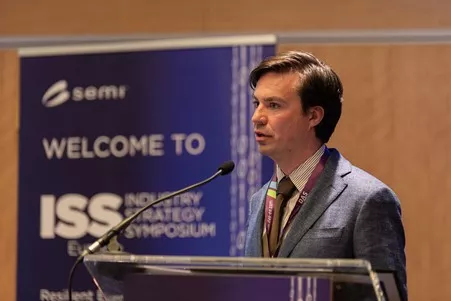
Christopher Frieling, Director of Advocacy and Public Policy, SEMI Europe
SEMI Europe is leading this initiative with active support and endorsement from the Executive Board members and participating companies, and we encourage interested parties to reach out to learn more about the Academy and SEMI’s initiatives for workforce development, and diversity and inclusion.
Europe Has the Opportunity to Change the Tide, But Must Act Quickly
Europe has been a leader in innovation and high-end manufacturing and now has a great opportunity to strengthen its position globally. Collaboration is key to overcoming supply chain disruptions, enabling production increases, paving the way to net-zero emissions, and attracting and retaining the right people to accomplish it all. There’s a lot at stake and the conditions under which we are operating have never been more volatile, uncertain, complex, or ambiguous – but this is Europe’s moment, and we must seize it. There have been remarkable individual company efforts from the industry and now we need to work together to collectively empower future progress.
SEMI plays a critical role in encouraging collaboration along the $2.5 trillion USD electronics supply chain and enabling cooperation and advocacy in key areas – such as sustainability, diversity, and workforce development. SEMI will continue to lead collaborative progress. However, SEMI relies on members and the industry at large to support strategic programs and initiatives to realize the changes needed to fuel European growth.
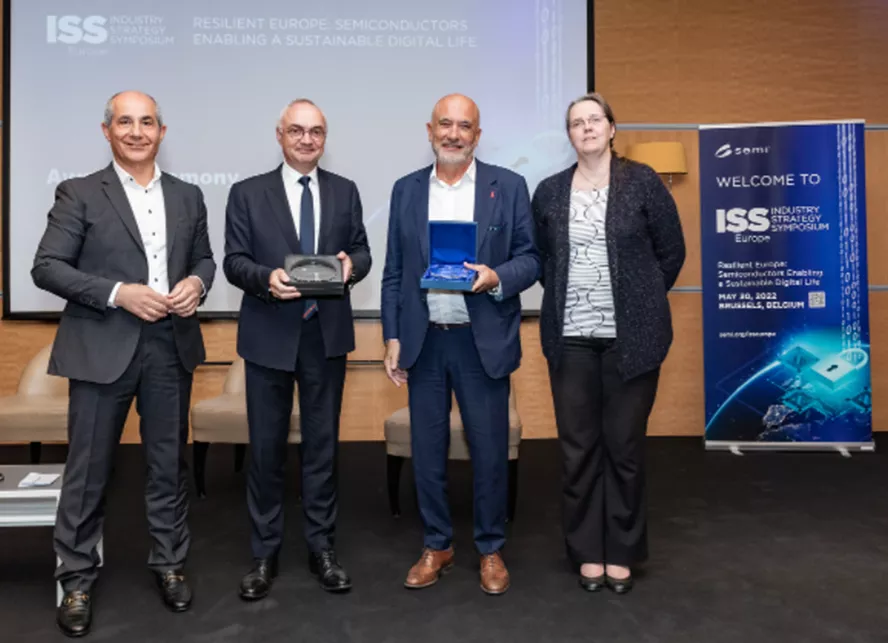
imec President and CEO Luc Van den hove (center left) accepting the 2021 European SEMI Award and Soitec CEO Paul Boudre (center right) the 2021 Special Service Award. Presented by Laith Altimime, President at SEMI Europe (left) and Anne Van den Bosch, Director Public R&D Policies and Programs at imec and Chair of the ISS Europe Committee (right).
Cassandra Melvin is Senior Director of Business Development and Operations at SEMI Europe.